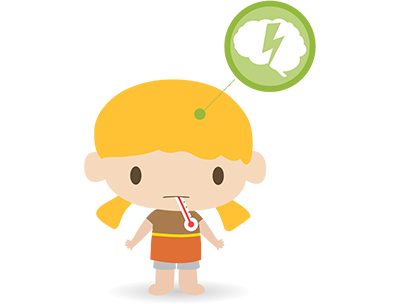
Print / Download Handout: English | French | Arabic | Punjabi
When a child has a seizure, they may have: stiffening of their arms or legs, short jerking movements of their muscles that cannot be controlled, smacking of their lips or strange tongue movements and rolling back of the eyes. Seizures almost always include loss of consciousness so your child may not be responsive.
A febrile seizure is when your child has a seizure when unwell with a fever. Febrile seizures usually only last a few minutes. Febrile seizures are quite common in healthy children between six months and six years old. Close to four per cent of all children will have at least one febrile seizure during their early childhood. These seizures can be quite frightening to families but rarely cause any harm to the child.
Seizures occur suddenly and usually without warning. You may see the following:
When you see your doctor, they will ask you to describe the seizure in detail. They will want to know how long it lasted and how your child was moving during the seizure.
The doctor will examine your child to look for a cause for the fever and to make sure your child is acting normally. If there is a clear cause for your child’s fever (e.g.: cough and runny nose), the doctor will usually not order any extra tests. However, if your doctor feels there is something wrong, they will order some tests to rule out other possible causes of seizures.
Most children who look well after a short febrile seizure are safe to go home. A small number of children may need some tests or extra time to be observed in the emergency department before they are safe to go home.
It is hard to predict if and when your child will have a febrile seizure. This type of seizure usually happens as a child’s temperature begins to rise and often before the parents realize their child has a fever.
About 30 per cent of children will have another febrile seizure. Most children ‘grow out’ of febrile seizures and less than two to three per cent of these kids will have a seizure disorder (epilepsy) later in life.
Remember that you have a normal, healthy child who may develop seizures in response to fevers. All children get sick once in a while, especially young children. Febrile seizures should not change your child's or family’s life very much. Treat your child the same way as any other normal healthy child.
How a child looks during a febrile seizure can be quite frightening to families, however brief seizures cause no damage and no long-term changes to the brain.

 It can be scary when your child is sick. But in most cases, you don’t need to go to the emergency
department. If you’re unsure, we’re
here to help.
It can be scary when your child is sick. But in most cases, you don’t need to go to the emergency
department. If you’re unsure, we’re
here to help.
The content provided on these pages is not intended to replace medical advice. If you have concerns about the health of your child, contact your health care provider directly. If your child has an emergency, go to the nearest emergency department or call 911. Alberta Health Services and Project HEAL strive to ensure that all material is correct but will not be held liable for errors or incomplete information contained in these pages.